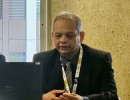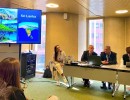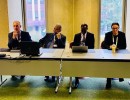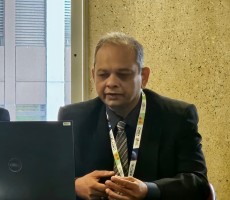
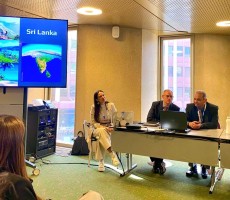
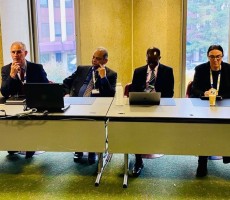
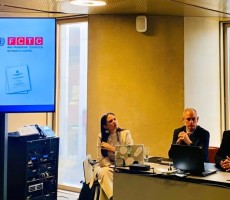
Chairman of the National Authority on Tobacco and Alcohol, and Head of Sri Lanka´s delegation to the COP11 of the FCTC, Dr. Ananda Rathnayaka, highlighted Sri Lanka’s achievements including the challenges faced and lessons learned in implementing the FCTC in the Sri Lanka at a side-event titled ‘Success Stories in Tobacco Control: Lessons Learned from FCTC Policy Implementation’ organized by the Global Alliance for Tobacco Control, on 20 November 2025.
The side event was held on the margins of the COP11 of the WHO FCTC, being held from 17-22 November 2025 in Geneva, Switzerland. The side event also showcased the success stories from Mexico, and Ghana
Statement by Dr. Ananda Rathnayaka, Chairman of the National Authority on Tobacco and Alcohol (NATA) at the General Debate of the Eleventh Session of the Conference of the Parties to the WHO Framework Convention on Tobacco Control (COP11) on 18 November 2025
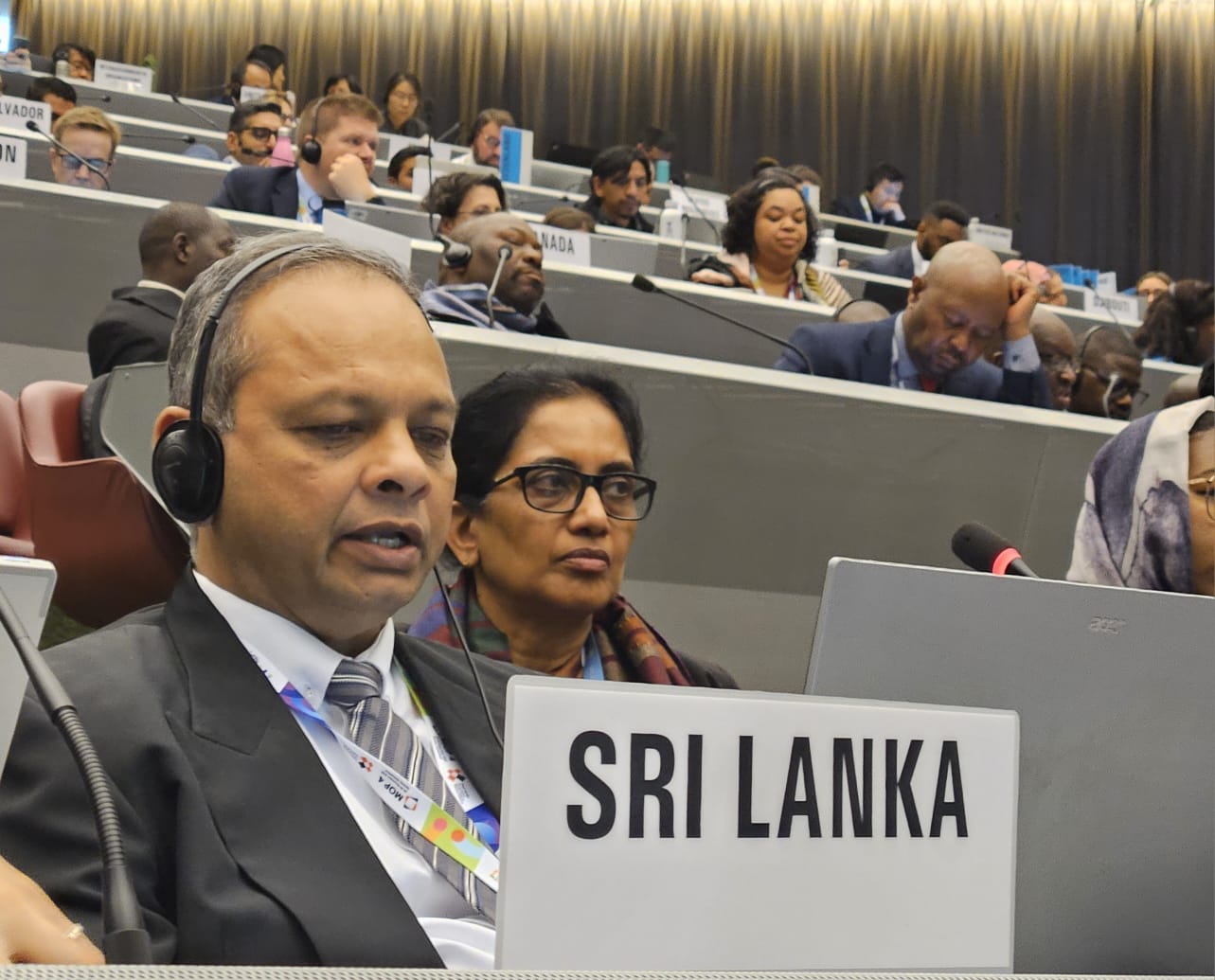
Madam President, Honourable Ministers, Distinguished Guests,
Thank you very much for the opportunity,
Sri Lanka was the first country in our region to ratify and sign the WHO Framework Convention on Tobacco Control (FCTC). Since then, we have remained steadfast in upholding its principles and values, guided by the convention that protecting our people from the harms of tobacco is essential to securing a healthy planet and a healthy future for generations to come.



Hon. Dr. Nalinda Jayatissa, Minister of Health and Mass Media paid a courtesy call on Dr. Tedros Adhanom Ghebreyesus, Director General of the World Health Organization on 20 May 2025.
During the meeting the main challenges in the country's health sector especially in Primary Health Care, aging population, Non-Communicable Diseases, workforce migration and local manufacturing of pharmaceuticals and WHO’s support and cooperation in addressing those challenges were discussed.

Thank you Mr. President,
I congratulate you on your election as the President of this Assembly.
Sri Lanka appreciates DG’s report, timely theme “One World for Health” which is an opportune agenda for Sri Lanka and whole Global Community.
We have faced many challenges during the past half century and recovering from recent economic turmoil with the strength of the public together with global goodwill and assistance. As a country, we appreciate the connectedness, opportunities and health benefits that united Global action enablers.
Our government policy “A thriving nation: a beautiful life” is also aligned with “One world for health”, and the need for concerted action to be back on track on the SDGs.
Mr. President,
Sri Lanka had Out Patient Department visits of 3 times of its population in 2023, therefore to “leave no one behind”, we have embarked on “comprehensive primary health care reforms”. The main objective of this reform is to prevent bypassing of primary health institutions which is a challenge in health service delivery in Sri Lanka.
I stress the need to address the concerns due to health workforce migration affecting global health. During the years 2022 to 2025, 726-Consultants and 1,116- Medical Officers have gone abroad.
Sri Lanka has had to bear significant financial losses after investing to produce our own health professionals. We believe destination countries too need to be more responsible and we call for effective and invigorated implementation of the WHO code for International recruitment of Health personnel.
Achieving Sustainable Financing for Health requires increased investment in health, especially to build resilience against challenges we are presently facing: debt, disease & devaluation. Whilst we collaborate across sectors and disciplines our Government is committed to protect the nation’s health.
I look forward to the insightful deliberations of honoured delegates and welcome strengthening of One World for Health.
Ayubowan - May you live long. Thank you
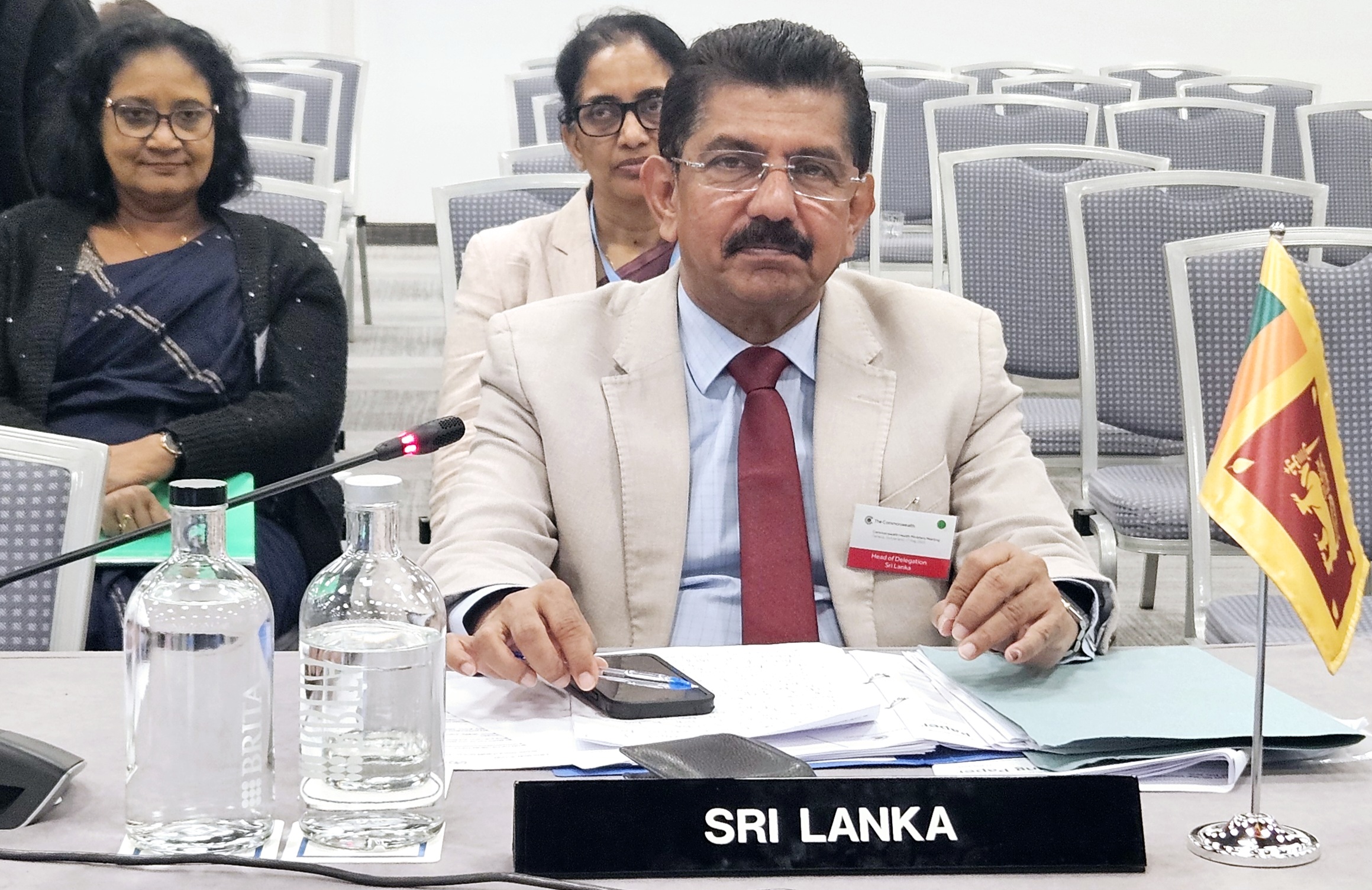
Chairperson, Secretary General of Commonwealth,
Fellow Health Ministers,
Higher Officials, Invitees and,
Ladies and Gentlemen,
Good Morning!
First of all, let me appreciate the selection of a vital and an important theme for all the countries, as the theme of the 37th Commonwealth Health Ministers’ meeting (CHMM).
Due to the reason that Health is a fundamental human right, in order to secure an equitable future, it is essential that we invest in health. It is important that you prioritize the problems that have considerable impact on health of nations. In this time, non-communicable diseases (NCDs) have become one of the priorities in the world and for the Commonwealth, for which an adequate investment is needed.
Non-communicable diseases are responsible for 74% of deaths worldwide. The scenario in most of the Commonwealth countries are the same. In order to get a good impact, you need to invest in key risk factors leading to NCDs. Therefore, investing in primary and primordial prevention for NCDs, is important to reduce future burden due to NCDs, in the Commonwealth countries.
I also support subject areas such as climate change, Universal Health Coverage and to promote healthy aging. Careful planning with data driven decision making combined with sustainable financing, definitely will lead to health equity.
Recently, Sri Lanka has undergone a severe economic downturn. We think that sustainable financing for an equitable Commonwealth includes Human Resources for Health, as it has significant implication on health financing. We experience a serious brain drain of health professionals compounding burden on the health system. I trust that the health professionals, specially doctors in post graduate training in developed countries, should return to serve their motherland as colossal amounts of resources have been spent on them over the years. Therefore, it is timely that we in the Commonwealth come to a consensus among us in commonwealth.
Let us work along these years theme, accompanied by solid plan of action to make a reality for an equitable Commonwealth.
Thank you!
156th session of Executive Board
Agenda item 13 - Global Traditional Medicine Strategy 2025-2034
statement by Sri Lanka
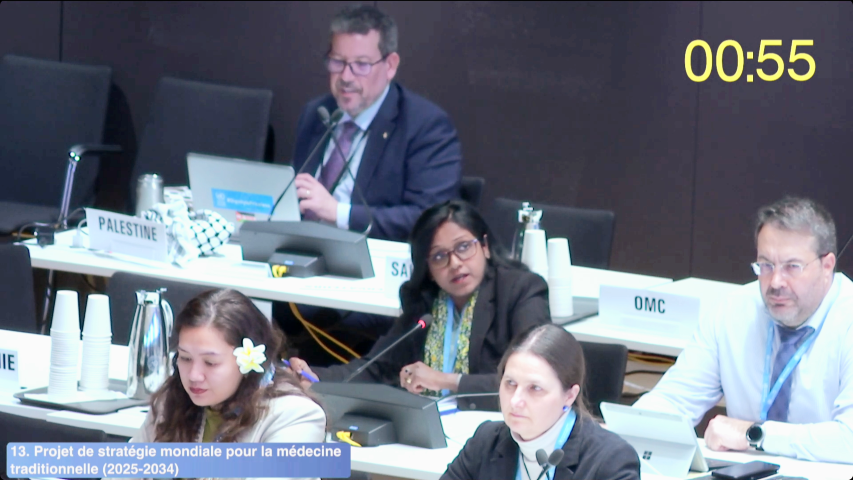
Thank you chair,
Sri Lanka welcomes the report by the Director General on the draft global traditional medicine strategy 2025-2034.
Sri Lanka appreciates the WHO, particularly the Traditional, Complementary and Integrative Medicine units for their role and tireless efforts in preparing the draft Global Traditional Medicine Strategy 2025-2034 and commends India’s leadership for bringing together the Global Friends of Traditional Medicine for convergence of ideas on this important area.
Sri Lanka is committed to promoting traditional medicine through the national traditional medicine policy Sri Lanka 2024-2034 which was launched in August 2024 and recognizes the policy thrust areas; Providing quality service delivery, Management of resources, Strong collaboration, Increasing the economic value of traditional Medicine, Protect the traditional inheritance of Indigenous and other communities, Large scale cultivation of medicinal plants for commercial use, and Manufacturing of traditional medicine products.
Sri Lanka is dedicated to improve the quality and safety of traditional medicine through its regulatory framework and safety monitoring system which is aligned with the Global strategic directions.
Chair,
Sri Lanka welcomes the WHO’s Global Traditional Medicine Strategy 2025-2034 and hopes that it will be endorsed by the Executive Board.
Further, Sri Lanka looks forward to engaging with WHO on potential assistance including through the Global Traditional Medicine in promoting the Global Traditional Medicine Strategy and capacity-building efforts.
Thank you
156th Session of Executive Board
Agenda item 14 - Global Strategy for Women’s Children’s and Adolescents’ Health
Statement by Sri Lanka
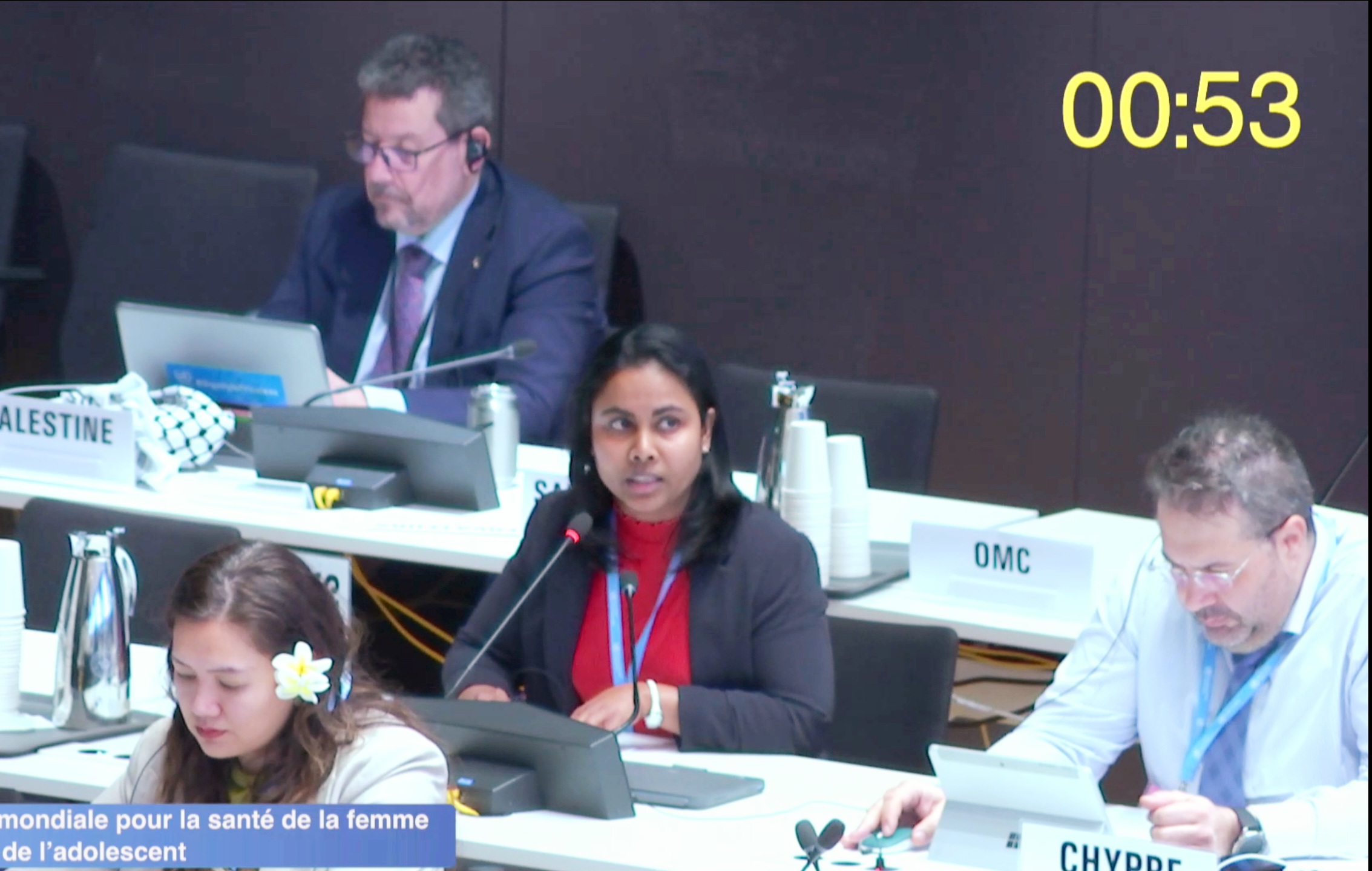
Thank you Chair
Sri Lanka is pleased to cosponsor the resolution on regulating the digital marketing of breast milk substitutes and appreciates Brazil and Mexico for leading the process.
Breastfeeding and adequate and safe infant and young child feeding practices promote optimal health and development of a child. Sri Lanka is strongly committed to follow the international Code of Marketing of Breast milk Substitutes which was adopted in 1981.
The revised national nutrition policy of Sri Lanka highlights the need for strong legislation to control unethical marketing of food and beverages, emphasizing on mothers, infant and young children’s nutrition. With the purpose of regulating the marketing of foods and nonalcoholic beverages to children, a nutrition profile has also been developed by Sri Lanka and new labeling and advertising regulations under the Food Act are implemented from January 2025 to safeguard children from unethical marketing.
Mr. Chair,
Promoting infant formula, products for young children, bottles and teats through digital marketing has become an emerging challenge worldwide. Increasing exposure of parents to these products and their misleading representation as a safe option equal to or better than breast milk, may affect infant and young child feeding practices.
In the wake of digital marketing, Sri Lanka stresses the importance of expanding the scope of the code of marketing of breast milk substitutes to meet the present concerns.
Sri Lanka joins with others and requests the Executive Board to endorse this important resolution by consensus, with the view to safeguarding infant and young children nutrition.
Thank you.





